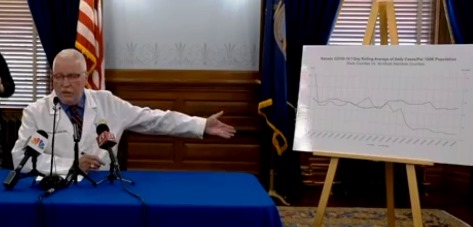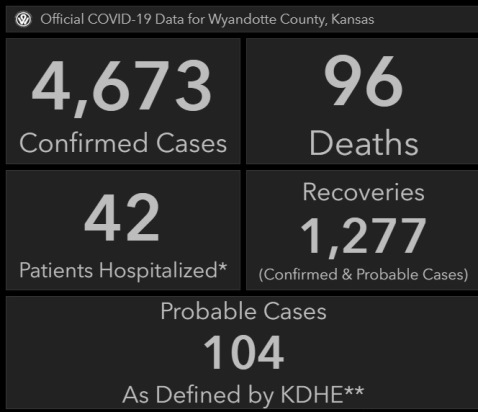

Masks work to prevent the spread of COVID-19, according to Dr. Lee Norman, and the “natural experiment” in Kansas shows it.
Dr. Norman, Kansas secretary of health, showed a chart during a Wednesday afternoon news conference. The chart had two lines, one for counties with mandatory mask orders and one for counties without them.
Although it wasn’t planned to be a scientific experiment or a trial, results from non-mask counties (the control group) were compared to results from counties with mandatory mask orders (the experimental counties). The results showed that masks work, Dr. Norman said.
There are 15 counties with mask mandates, including Wyandotte County, and about 90 Kansas counties without them, he said. The 15 counties account for two-thirds of the population in the state, and are mostly urban areas where people may come into contact with others more frequently.
Dr. Norman’s chart showed a significant decline in COVID-19 rates in counties with mask orders, he said, while counties without mask mandates had a flat rate. The governor’s mask order went into effect July 3; in Wyandotte County, masks have been mandated since June 30 by local health officials.
Dr. Norman’s chart covered July 12 through Aug. 3. It compared the number of cases per 100,000 in each county in the two groups, on a 7-day average. There is an improvement seen in counties where mask-wearing is mandatory, he said.
Since a vaccine is not available yet, masks are the only physical tools available at this moment to fight COVID-19, Dr. Norman said.
Dr. Norman said the Kansas Department of Health and Environment is sharing the stories of COVID-19 victims, with their permission, on a series of videos to help people learn more about the illness. Some patients were asymptomatic, and others had to be on a ventilator for a period of time, he said.
He said he has talked to some COVID-19 patients who had prolonged symptoms for months after having recovered from COVID.
The understanding of COVID-19 has been changing. For instance, it used to be an anomaly to find children who were hospitalized with it, he said. But now, it is more common, and there are child COVID-19 patients at Children’s Mercy Hospital frequently, according to Dr. Norman.
One student, aged 19, from Dodge City, had very mild COVID-19 symptoms in May, but this past weekend, he was bedridden with severe headache and fatigue, he said. He has had those symptoms since being hospitalized in May.
Another patient, aged 42, an athlete, is 125 days out from being diagnosed with COVID-19, and is still experiencing burning in the lungs and shortness of breath, he said.
It is humbling that they know so little about this disease, Dr. Norman said. They are still learning.
“I know wearing a mask is not the most comfortable thing to do,” Dr. Norman said. However, they’re getting a lot of aggregated data solidifying the belief that masks work, he said.
They are learning about the biology of the disease, and he said it is becoming clear that they should do everything possible to push the curve of the disease down as much as possible especially before the start of the school year.
Dr. Dana Hawkinson, medical director of infection prevention and control at the University of Kansas Health System, said it will take effort from everyone to get the state’s positive test rate of 9 percent down before schools can reopen and before a vaccine is available.
At the news conference on Wednesday morning at the University of Kansas Health System, doctors warning against vaping, and there are some reasons to believe that some who vapes may be more susceptible to COVID-19.
Dr. Matthias Salathe, chair of internal medicine at KU Medical Center and pulmonologist at KU Health System, said vaping can be just as dangerous as smoking. Some of the vaping patients now in the hospital have lungs that look like COVID-19 damage but are a different illness, according to Dr. Salathe. Vaping can cause lung injury, he said.
Dr. Amanda Olinger, director of pediatric services at KU Health System Marillac Campus, said adults vape and smoke on personal and private levels, in general, while for adolescents, it is a highly social event. They get together to smoke or vape with friends.
In the past, she’s seen infections transfer from one to another through vaping, she said. Last fall some mononucleosis cases were linked back to vaping and sharing, according to Dr. Olinger.
With teens in close proximity, not wearing a mask, and passing a vaping tube from one to another, breathing through it, that increases the risk of infection, according to Dr. Olinger.
It’s hard to get through to teens if they can’t see immediate harmful effects, she said.
Dr. Salathe was very optimistic a vaccine for the virus will be available by the first of the year. Because of the fast-tracking process, future vaccines will be available much quicker, he believes.
Dr. Hawkinson said there were 26 COVID-19 patients at KU Health System on Wednesday, down one from Tuesday. Five were in the intensive care unit, one less than Tuesday, and three were on ventilators, two less from Tuesday. The hospital peaked at 36 patients last week.
On Wednesday morning, Kansas had 29,717 cumulative positive COVID-19 cases, an increase of 841 since Monday, Dr. Norman said. The state had a cumulative 368 deaths, an increase of three since Monday.
Wyandotte County reported 4,673 cumulative positive COVID-19 cases at 1:15 p.m. Wednesday, an increase of 73 since Tuesday, according to the Unified Government COVID-19 webpage. There were no new deaths; the cumulative total remained at 96.
Free testing offered
Free COVID-19 testing is planned from 10 a.m. to 1 p.m. Thursday, Aug. 6, at the Holy Name of Jesus Catholic Church, 16 S. Iowa St., Kansas City, Kansas.
Free testing also is offered from 5 to 7 p.m. Thursday, Aug. 6, at the Vibrant Health Argentine location, 1428 S. 32nd St., Kansas City, Kansas.
The pop-up tests are offered through Swope and Vibrant Health and the Health Equity Task Force.
Free testing also is offered from 9 a.m. to 3 p.m. Monday through Friday at the Unified Government Health Department parking lot at 6th and Ann, Kansas City, Kansas. For more information, call 311.
For more information on who may be tested and what to bring, visit https://wyandotte-county-covid-19-hub-unifiedgov.hub.arcgis.com/pages/what-to-do-if-you-think-you-have-covid-19.
The KU doctors’ news conference is online at https://www.facebook.com/kuhospital/videos/901961476968352
The KDHE news conference is online at https://www.facebook.com/KDHEnews/videos/3181624445282231.
The Wyandotte County school start order is online at https://alpha.wycokck.org/Coronavirus-COVID-19-Information.
Wyandotte County is under a mandatory mask order and is in Phase 3 of the state’s reopening plan. For more information, residents may visit the UG COVID-19 website at https://alpha.wycokck.org/Coronavirus-COVID-19-Information or call 311 for more information.
The CDC’s COVID-19 web page is at https://www.cdc.gov/coronavirus/2019-nCoV/index.html.
